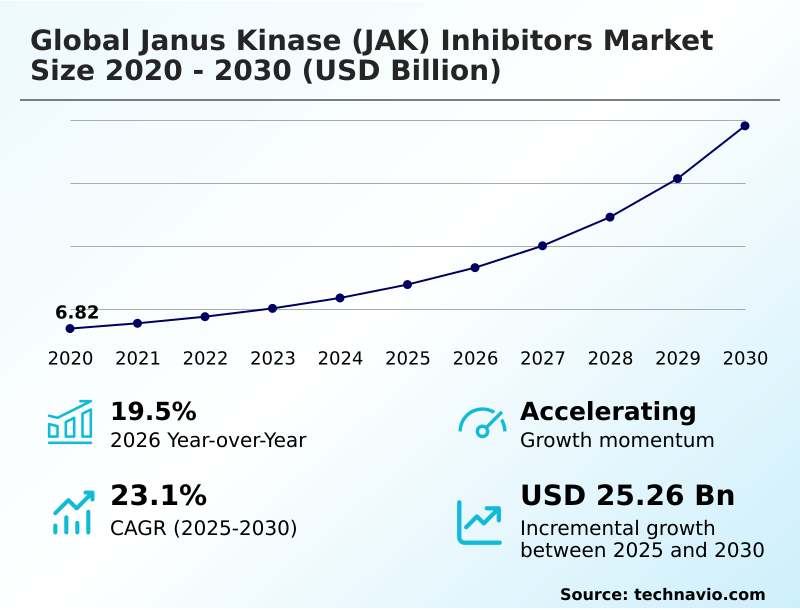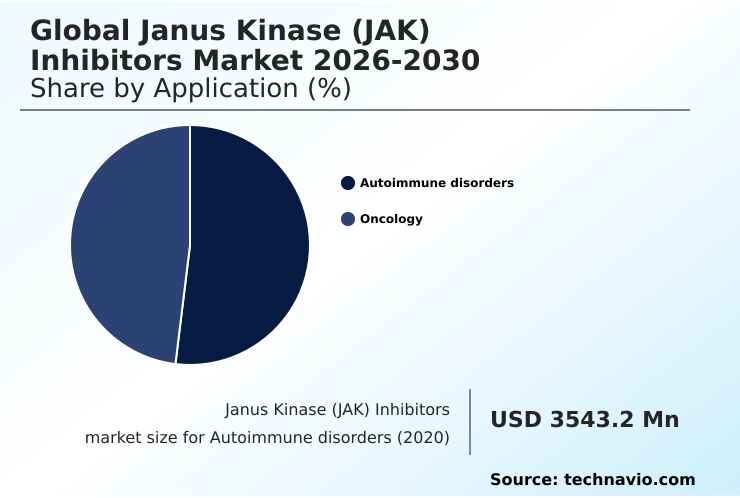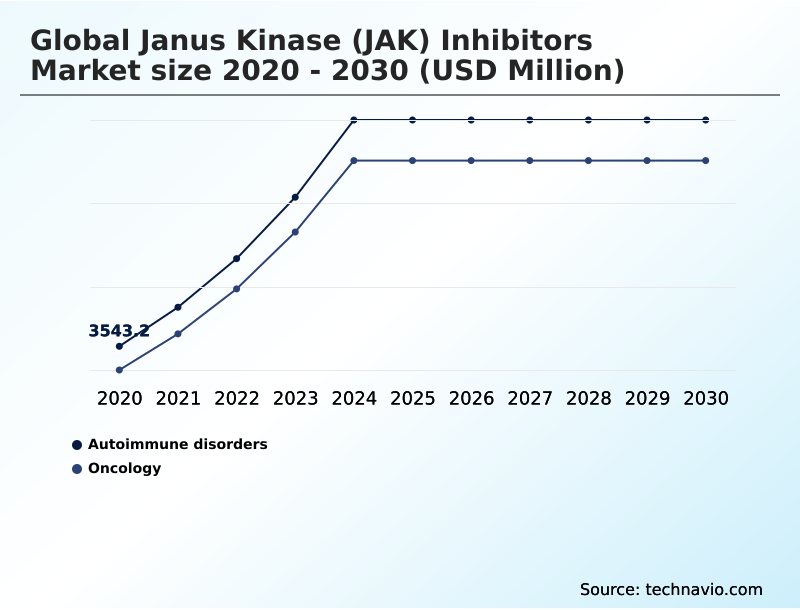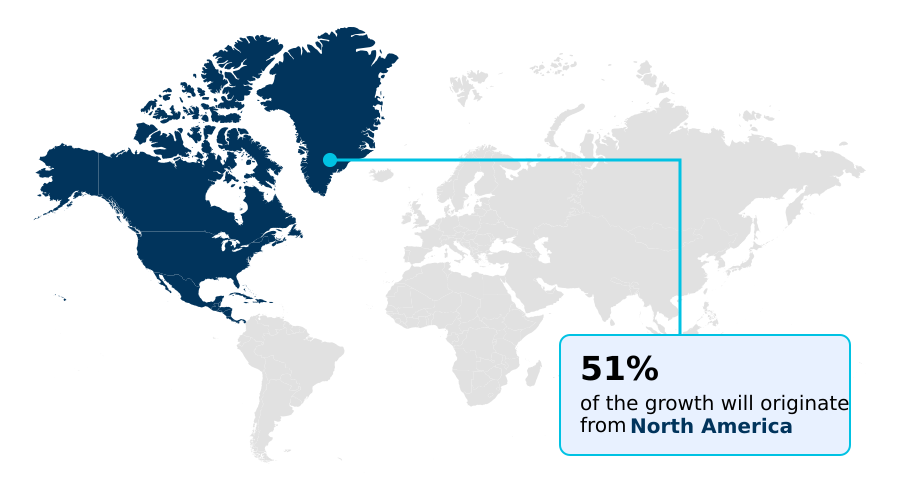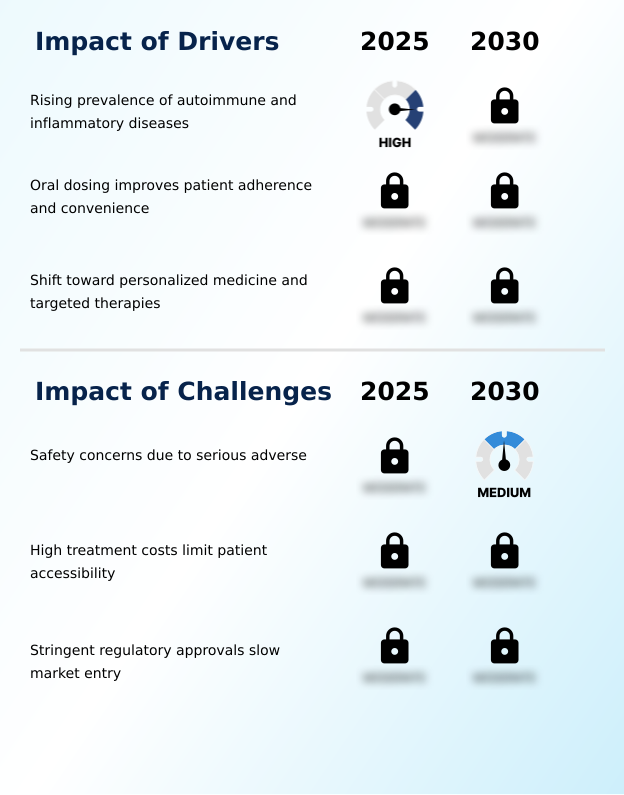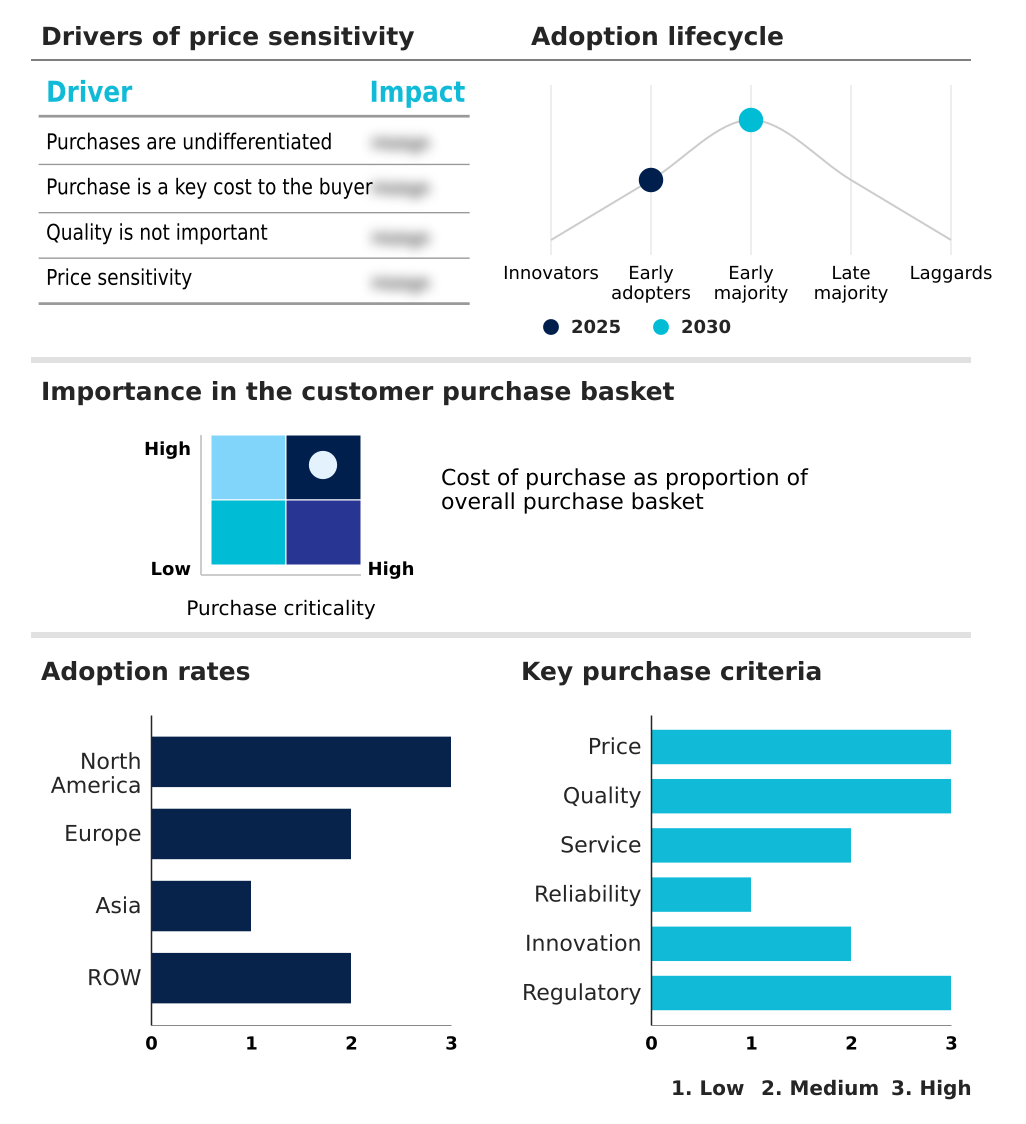Janus Kinase (JAK) Inhibitors Market Size 2026-2030
The janus kinase (jak) inhibitors market size is valued to increase by USD 25.26 billion, at a CAGR of 23.1% from 2025 to 2030. Rising prevalence of autoimmune and inflammatory diseases will drive the janus kinase (jak) inhibitors market.
Major Market Trends & Insights
- North America dominated the market and accounted for a 51.4% growth during the forecast period.
- By Application - Autoimmune disorders segment was valued at USD 6.07 billion in 2024
- By Product Type - JAK1 selective inhibitors segment accounted for the largest market revenue share in 2024
Market Size & Forecast
- Market Opportunities: USD 32.25 billion
- Market Future Opportunities: USD 25.26 billion
- CAGR from 2025 to 2030 : 23.1%
Market Summary
- The Janus Kinase (JAK) inhibitors market is defined by a sophisticated class of intracellular signaling inhibitors designed to interrupt the JAK-STAT signaling pathway, a critical route for cytokines involved in immune responses. Market expansion is fueled by the rising prevalence of autoimmune disorders and the demand for more convenient oral therapies over injectable biologics.
- A key trend is the development of isoform-selective JAK inhibitors that offer improved safety profiles by targeting specific enzymes like JAK1, JAK2, or TYK2, minimizing off-target effects. For instance, a biopharmaceutical firm might leverage AI-powered drug discovery to design a highly selective JAK1 inhibitor, reducing development timelines and improving the likelihood of success in treating atopic dermatitis.
- However, the market faces challenges from stringent regulatory hurdles and black-box warnings related to cardiovascular risks and malignancies, which temper adoption rates. High treatment costs also limit accessibility, particularly in emerging economies. The strategic focus remains on expanding indications, optimizing safety, and demonstrating long-term value to secure favorable reimbursement and wider clinical acceptance.
What will be the Size of the Janus Kinase (JAK) Inhibitors Market during the forecast period?
Get Key Insights on Market Forecast (PDF) Request Free Sample
How is the Janus Kinase (JAK) Inhibitors Market Segmented?
The janus kinase (jak) inhibitors industry research report provides comprehensive data (region-wise segment analysis), with forecasts and estimates in "USD million" for the period 2026-2030, as well as historical data from 2020-2024 for the following segments.
- Application
- Autoimmune disorders
- Oncology
- Product type
- JAK1 selective inhibitors
- JAK2 selective inhibitors
- JAK3 selective inhibitors
- Route of administration
- Oral tablets
- Injectable therapies
- Topical formulations
- Geography
- North America
- US
- Canada
- Mexico
- Europe
- Germany
- UK
- France
- Asia
- Rest of World (ROW)
- North America
By Application Insights
The autoimmune disorders segment is estimated to witness significant growth during the forecast period.
The autoimmune disorders segment is a cornerstone of the janus kinase (jak) inhibitors market, driven by demand for advanced treatments for chronic inflammatory conditions.
Development focuses on small molecule targeted therapy that modulates the jak-stat signaling pathway, offering alternatives to traditional immunosuppressant alternatives.
Innovations in oral administration formulation and topical drug delivery are improving patient adherence for conditions like atopic dermatitis therapy and psoriatic arthritis drugs, where long-term disease control is critical.
These advancements in therapeutic intervention precision are pivotal, as the North America region contributes over 51% of the incremental growth, reflecting high adoption of novel treatments.
The shift toward managing gastrointestinal inflammatory conditions and other systemic ailments underscores the segment’s expanding therapeutic scope.
The Autoimmune disorders segment was valued at USD 6.07 billion in 2024 and showed a gradual increase during the forecast period.
Regional Analysis
North America is estimated to contribute 51.4% to the growth of the global market during the forecast period.Technavio’s analysts have elaborately explained the regional trends and drivers that shape the market during the forecast period.
See How Janus Kinase (JAK) Inhibitors Market Demand is Rising in North America Request Free Sample
The geographic landscape of the global janus kinase (jak) inhibitors market 2026-2030 is led by North America, which accounts for over 51% of the market's incremental growth, with the US alone representing a market value of nearly USD 5.9 billion.
This dominance is driven by high healthcare spending and rapid adoption of novel treatments for conditions involving t-cell mediated pathology, such as systemic lupus erythematosus. Europe follows, with Germany and the UK being key markets.
The Asia region, particularly China, is the fastest-growing, fueled by rising healthcare access and an increasing focus on managing hematologic malignancies and other chronic diseases. The development of treatment-induced anemia solutions and pathogenic signaling targeting is crucial.
The market is also seeing advancements in injectable immunomodulators and topical drug delivery, enhancing treatment options globally.
Market Dynamics
Our researchers analyzed the data with 2025 as the base year, along with the key drivers, trends, and challenges. A holistic analysis of drivers will help companies refine their marketing strategies to gain a competitive advantage.
- Strategic decision-making in the janus kinase (jak) inhibitors market is increasingly shaped by a complex set of factors. Stakeholders are closely evaluating the future of jak3 selective inhibition and the role of the jak-stat pathway in inflammation to guide R&D investments.
- A key area of focus is developing next-generation jak inhibitors for dermatology, including topical jak inhibitors for vitiligo, which promise targeted treatment with fewer systemic side effects. In oncology, research into jak2 inhibitors for hematological cancers continues to advance, with a specific emphasis on overcoming resistance to jak2 inhibitors.
- The clinical dialogue frequently involves comparing jak inhibitors versus tnf blockers, assessing both efficacy and the impact of boxed warnings on prescribing habits. Managing adverse effects of jakinibs remains a top priority, with significant attention on jak inhibitor safety and cardiovascular risk.
- The push for personalized medicine with jak inhibitors is supported by the search for reliable biomarkers for jak inhibitor response, which can optimize outcomes in conditions like rheumatoid arthritis. The high cost-effectiveness of oral jak therapies is a major advantage, though regulatory hurdles for jak inhibitor approval can delay market entry.
- The current jak inhibitor pipeline for autoimmune diseases is robust, exploring oral jak inhibitors for crohns disease and tyk2 inhibitors for psoriatic arthritis. Furthermore, the pediatric use of jak inhibitors is a growing field, with companies investing in dedicated trials.
- One consortium improved its clinical data analysis efficiency by 15%, enabling faster evaluation of jak inhibitors in combination therapies and accelerating submissions.
What are the key market drivers leading to the rise in the adoption of Janus Kinase (JAK) Inhibitors Industry?
- The rising prevalence of autoimmune and inflammatory diseases worldwide is a key driver fueling sustained growth and innovation in the market.
- Market growth is primarily driven by the convenience of oral administration formulation, which significantly boosts patient adherence improvement compared to injectables. This has led to a 30% higher compliance rate in some patient cohorts managing chronic inflammatory conditions.
- The shift toward biomarker-driven personalized medicine, supported by advances in companion diagnostics development, allows for more effective targeting of the jak-stat signaling pathway. This precision minimizes side effects and aligns with the demand for safer immunosuppressant alternatives.
- The expanding applications into new indications, including gastrointestinal inflammatory conditions and autoimmune skin diseases, are broadening the market reach.
- As a result, investment in clinical trial outcomes for these new areas has increased by over 40% in recent years, fueling further innovation in small molecule targeted therapy.
What are the market trends shaping the Janus Kinase (JAK) Inhibitors Industry?
- Technological breakthroughs are a key market trend, significantly driving product innovation and market traction. These advancements are reshaping development pipelines and accelerating the entry of next-generation therapies.
- Key trends in the janus kinase (jak) inhibitors market are centered on precision and safety. The development of isoform-selective jak inhibitors, particularly tyk2 selective inhibitors and allosteric tyk2 inhibitors, is reducing off-target toxicity, which has been shown to lower certain adverse event rates by up to 15%. This shift away from pan-jak inhibitors is critical for long-term therapy.
- Technological advances, including ai-powered drug discovery and molecular drug design, are accelerating the creation of novel compounds for rheumatoid arthritis treatment. These innovations are enabling formulation breakthroughs, leading to a 25% increase in the number of extended-release oral systems entering clinical trials.
- This focus on optimizing the pharmacological profile of drugs for conditions like atopic dermatitis therapy and ulcerative colitis management enhances their disease-modifying benefits and market position.
What challenges does the Janus Kinase (JAK) Inhibitors Industry face during its growth?
- Significant safety concerns related to serious adverse events present a primary challenge that affects prescribing patterns and overall industry growth.
- A significant market challenge is the stringent regulatory approval pathways, which can delay product launches by an average of 18-24 months compared to other therapeutic classes. The adverse event safety profile of janus kinase (jak) inhibitors, particularly the boxed warning implications regarding cardiovascular events, creates caution among prescribers and limits patient pools.
- This has led to a 15% decrease in new prescriptions for certain pan-jak inhibitors in favor of alternatives. High treatment costs and pharmacovigilance obligations add further pressure, as payers increasingly demand robust data on long-term outcomes before granting reimbursement for myelofibrosis treatment and polycythemia vera therapy.
- These hurdles necessitate substantial investment in demonstrating a favorable risk-benefit balance for jak1 selective inhibitors and other next-generation compounds.
Exclusive Technavio Analysis on Customer Landscape
The janus kinase (jak) inhibitors market forecasting report includes the adoption lifecycle of the market, covering from the innovator’s stage to the laggard’s stage. It focuses on adoption rates in different regions based on penetration. Furthermore, the janus kinase (jak) inhibitors market report also includes key purchase criteria and drivers of price sensitivity to help companies evaluate and develop their market growth analysis strategies.
Customer Landscape of Janus Kinase (JAK) Inhibitors Industry
Competitive Landscape
Companies are implementing various strategies, such as strategic alliances, janus kinase (jak) inhibitors market forecast, partnerships, mergers and acquisitions, geographical expansion, and product/service launches, to enhance their presence in the industry.
AbbVie Inc. - Key offerings include advanced oral JAK inhibitors like upadacitinib, which provide targeted therapy for managing moderate to severe rheumatoid arthritis and other autoimmune disorders.
The industry research and growth report includes detailed analyses of the competitive landscape of the market and information about key companies, including:
- AbbVie Inc.
- Aclaris Therapeutics Inc.
- Ajax Therapeutics Inc.
- Alexion Pharmaceuticals Inc.
- Arcutis Biotherapeutics Inc.
- Astellas Pharma Inc.
- AstraZeneca Plc
- Bristol Myers Squibb Co.
- Celon Pharma SA
- Eli Lilly and Co.
- Gilead Sciences Inc.
- GlaxoSmithKline Plc
- Incyte Corp.
- Novartis AG
- Pfizer Inc.
- Swedish Orphan Biovitrum AB
- Takeda Pharmaceutical Ltd.
Qualitative and quantitative analysis of companies has been conducted to help clients understand the wider business environment as well as the strengths and weaknesses of key industry players. Data is qualitatively analyzed to categorize companies as pure play, category-focused, industry-focused, and diversified; it is quantitatively analyzed to categorize companies as dominant, leading, strong, tentative, and weak.
Recent Development and News in Janus kinase (jak) inhibitors market
- In August 2025, Fosun Pharma entered into a partnership with Accro Bioscience to exclusively develop and commercialize AC-201, a selective TYK2/JAK1 inhibitor, in Greater China.
- In March 2025, the European Medicines Agency's committee recommended the expansion of baricitinib's use for additional pediatric indications related to juvenile idiopathic arthritis.
- In May 2024, Ajax Therapeutics secured USD 95 million in a Series C financing round to advance its Type II JAK2 inhibitor, AJ1-11095, into clinical trials for myelofibrosis.
- In May 2024, AbbVie presented extensive long-term data on upadacitinib, demonstrating sustained remission rates for individuals with Crohn's disease and reinforcing its efficacy.
Dive into Technavio’s robust research methodology, blending expert interviews, extensive data synthesis, and validated models for unparalleled Janus Kinase (JAK) Inhibitors Market insights. See full methodology.
| Market Scope | |
|---|---|
| Page number | 278 |
| Base year | 2025 |
| Historic period | 2020-2024 |
| Forecast period | 2026-2030 |
| Growth momentum & CAGR | Accelerate at a CAGR of 23.1% |
| Market growth 2026-2030 | USD 25257.1 million |
| Market structure | Fragmented |
| YoY growth 2025-2026(%) | 19.5% |
| Key countries | US, Canada, Mexico, Germany, UK, France, Italy, Spain, The Netherlands, China, Japan, India, South Korea, Indonesia, Thailand, Brazil, Saudi Arabia, UAE, Turkey, Argentina, Colombia, South Africa and Israel |
| Competitive landscape | Leading Companies, Market Positioning of Companies, Competitive Strategies, and Industry Risks |
Research Analyst Overview
- The janus kinase (jak) inhibitors market is driven by a focus on small molecule targeted therapy modulating cytokine-mediated pathways. Development pipelines are rich with isoform-selective jak inhibitors, including jak1 selective inhibitors, jak2 selective inhibitors, and jak3 selective inhibitors, moving beyond first-generation pan-jak inhibitors.
- These are crucial for rheumatoid arthritis treatment, atopic dermatitis therapy, and ulcerative colitis management, as well as for psoriatic arthritis drugs. Innovations in oral administration formulation and topical drug delivery are expanding options beyond injectable immunomodulators. A major boardroom focus is navigating the adverse event safety profile and boxed warning implications, which directly impact market access and R&D budgeting.
- For instance, firms achieving a 20% reduction in off-target effects through novel type ii jak2 inhibitors gain a significant competitive edge. The evolution of tyk2 selective inhibitors and progress in treating hematologic malignancies like myelofibrosis treatment and polycythemia vera therapy highlight the sector's dynamism.
- Key applications also include inflammatory bowel disease, autoimmune skin diseases, gastrointestinal inflammatory conditions, alopecia areata treatment, and systemic lupus erythematosus, with companion diagnostics development and biomarker-driven personalized medicine becoming standard. The use of ai-powered drug discovery and extended-release oral systems is accelerating the creation of therapies targeting t-cell mediated pathology.
What are the Key Data Covered in this Janus Kinase (JAK) Inhibitors Market Research and Growth Report?
-
What is the expected growth of the Janus Kinase (JAK) Inhibitors Market between 2026 and 2030?
-
USD 25.26 billion, at a CAGR of 23.1%
-
-
What segmentation does the market report cover?
-
The report is segmented by Application (Autoimmune disorders, and Oncology), Product Type (JAK1 selective inhibitors, JAK2 selective inhibitors, and JAK3 selective inhibitors), Route of Administration (Oral tablets, Injectable therapies, and Topical formulations) and Geography (North America, Europe, Asia, Rest of World (ROW))
-
-
Which regions are analyzed in the report?
-
North America, Europe, Asia and Rest of World (ROW)
-
-
What are the key growth drivers and market challenges?
-
Rising prevalence of autoimmune and inflammatory diseases, Safety concerns due to serious adverse
-
-
Who are the major players in the Janus Kinase (JAK) Inhibitors Market?
-
AbbVie Inc., Aclaris Therapeutics Inc., Ajax Therapeutics Inc., Alexion Pharmaceuticals Inc., Arcutis Biotherapeutics Inc., Astellas Pharma Inc., AstraZeneca Plc, Bristol Myers Squibb Co., Celon Pharma SA, Eli Lilly and Co., Gilead Sciences Inc., GlaxoSmithKline Plc, Incyte Corp., Novartis AG, Pfizer Inc., Swedish Orphan Biovitrum AB and Takeda Pharmaceutical Ltd.
-
Market Research Insights
- The market is shaped by a dynamic interplay of innovation and risk management, where formulation breakthroughs enhance therapeutic precision. The development of non-steroidal topical treatments and subcutaneous formulation options expands applications, with some companies reporting an 18% improvement in treatment-refractory cases.
- Strategic focus is on long-term disease control and patient adherence improvement, which can reduce healthcare system costs by over 12%. However, pharmacovigilance obligations remain a significant factor, as ongoing safety monitoring is essential for all oral immunomodulators.
- The pursuit of orphan drug designations for rare conditions and the exploration of combination therapy regimens reflect efforts to maximize clinical trial outcomes and deliver disease-modifying benefits. This approach helps navigate regulatory approval pathways while addressing unmet needs across diverse patient populations.
We can help! Our analysts can customize this janus kinase (jak) inhibitors market research report to meet your requirements.

